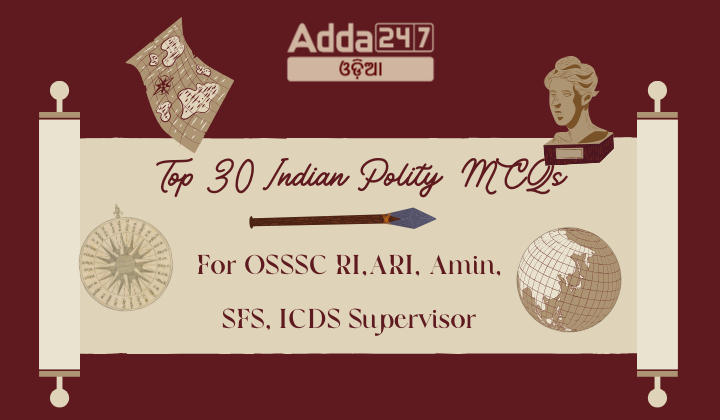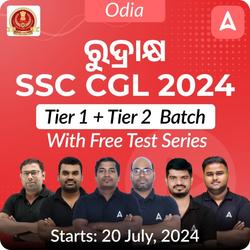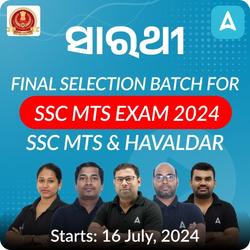Indian Polity is a crucial section for competitive exams like OSSSC RI, ARI, Amin, SFS, and ICDS, where a solid understanding of the Indian Constitution, political institutions, and fundamental principles of governance is tested. Top MCQs often cover essential topics such as the features and significance of the Preamble, the fundamental rights and duties of citizens, and the Directive Principles of State Policy. Questions might delve into the structure and functioning of the Parliament, including the roles of the Lok Sabha and Rajya Sabha, the process of law-making, and the nuances of parliamentary procedures. The examination can also include queries about the President’s and Governor’s powers, the Council of Ministers, and the Prime Minister’s role in the executive branch. The federal structure of India, including the distribution of powers between the Centre and States, the role of the Judiciary, the appointment and functions of the Supreme Court and High Courts, and the process of judicial review, are critical areas frequently explored in these MCQs.
Top 30 Indian Polity MCQs for OSSSC RI,ARI, Amin, SFS, ICDS Supervisor
- What was the purpose of the Cabinet Mission sent to India in 1946?
(a) To negotiate India’s independence
(b) To establish a British interim government
(c) To divide India into two separate nations
(d) To annex India as a British colony
Ans. (a) To negotiate India’s independence - Who led the First Interim National Government of India?
(a) Mahatma Gandhi
(b) Jawaharlal Nehru
(c) Sardar Vallabhbhai Patel
(d) Pandit Nehru
Ans. (d) Pandit Nehru - Who was the President of the Constituent Assembly of India?
(a) Dr. Rajendra Prasad
(b) Dr. B.R. Ambedkar
(c) Dr. Sachidanand Sinha
(d) Dr. Sarvepalli Radhakrishnan
Ans. (a) Dr. Rajendra Prasad - Which country’s constitution provided the concept of Fundamental Rights to the Indian Constitution?
(a) USA
(b) UK
(c) France
(d) Germany
Ans. (a) USA - Which Part of the Indian Constitution deals with Citizenship?
(a) Part I
(b) Part II
(c) Part III
(d) Part IV
Ans. (b) Part II - The concept of Directive Principles of State Policy in the Indian Constitution is borrowed from the constitution of which country?
(a) USA
(b) UK
(c) Ireland
(d) Australia
Ans. (c) Ireland - Which Amendment Act of the Indian Constitution deleted the Right to Property from the list of Fundamental Rights?
(a) 42nd Amendment Act
(b) 44th Amendment Act
(c) 52nd Amendment Act
(d) 56th Amendment Act
Ans. (b) 44th Amendment Act - The concept of a single citizenship for the whole of India is taken from which country’s constitution?
(a) USA
(b) UK
(c) Canada
(d) Australia
Ans. (a) UK - Which Schedule of the Indian Constitution deals with the allocation of seats in the Rajya Sabha?
(a) First Schedule
(b) Second Schedule
(c) Fourth Schedule
(d) Eighth Schedule
Ans. (c) Fourth Schedule - The Preamble of the Indian Constitution was amended by which Amendment Act to include the words “Socialist” and “Secular”?
(a) 42nd Amendment Act
(b) 44th Amendment Act
(c) 52nd Amendment Act
(d) 56th Amendment Act
Ans. (a) 42nd Amendment Act - Who is considered the father of the Indian Constitution?
(a) Mahatma Gandhi
(b) Jawaharlal Nehru
(c) Dr. B.R. Ambedkar
(d) Sardar Vallabhbhai Patel
Ans. (c) Dr. B.R. Ambedkar - Which Part of the Indian Constitution deals with the Emergency Provisions?
(a) Part XVIII
(b) Part XIV
(c) Part XX
(d) Part XII
Ans. (a) Part XVIII - The concept of judicial review in India is borrowed from which country?
(a) UK
(b) USA
(c) France
(d) Germany
Ans. (b) USA - Who appoints the Governor of a State in India?
(a) President
(b) Prime Minister
(c) Chief Minister
(d) Chief Justice of India
Ans. (a) President - The Fundamental Duties of citizens were added to the Indian Constitution by which Amendment Act?
(a) 40th Amendment Act
(b) 42nd Amendment Act
(c) 44th Amendment Act
(d) 52nd Amendment Act
Ans. (b) 42nd Amendment Act - The provision for impeachment of the President of India is mentioned in which Article of the Constitution?
(a) Article 61
(b) Article 72
(c) Article 76
(d) Article 78
Ans. (a) Article 61 - Which Part of the Indian Constitution deals with the Panchayats?
(a) Part IX
(b) Part IXA
(c) Part X
(d) Part XI
Ans. (a) Part IX - Which Schedule of the Indian Constitution deals with the administration of Scheduled Areas and Scheduled Tribes?
(a) First Schedule
(b) Second Schedule
(c) Fifth Schedule
(d) Sixth Schedule
Ans. (c) Fifth Schedule - The concept of federalism in the Indian Constitution is borrowed from which country?
(a) USA
(b) UK
(c) Australia
(d) Canada
Ans. (a) USA - Who was the first Vice-President of India?
(a) Dr. Rajendra Prasad
(b) Dr. S. Radhakrishnan
(c) Dr. B.R. Ambedkar
(d) Jawaharlal Nehru
Ans. (b) Dr. S. Radhakrishnan - Which Part of the Indian Constitution deals with the official languages of India?
(a) Part XV
(b) Part XVII
(c) Part XIX
(d) Part XX
Ans. (b) Part XVII - Who administers the oath of office to the President of India?
(a) Chief Justice of India
(b) Prime Minister
(c) Speaker of Lok Sabha
(d) Vice President
Ans. (a) Chief Justice of India - The Election Commission of India is mentioned in which Article of the Constitution?
(a) Article 324
(b) Article 335
(c) Article 343
(d) Article 350
Ans. (a) Article 324 - The right to property was removed from the list of Fundamental Rights and made a legal right by which Constitutional Amendment?
(a) 42nd Amendment Act
(b) 44th Amendment Act
(c) 52nd Amendment Act
(d) 56th Amendment Act
Ans. (b) 44th Amendment Act - The concept of a parliamentary system of government in India is taken from which country?
(a) USA
(b) UK
(c) France
(d) Germany
Ans. (b) UK - Which Amendment Act of the Indian Constitution added Part IX dealing with the Panchayats?
(a) 73rd Amendment Act
(b) 74th Amendment Act
(c) 75th Amendment Act
(d) 76th Amendment Act
Ans. (a) 73rd Amendment Act - The powers, authority, and responsibilities of Panchayats are included in which Schedule of the Constitution?
(a) Ninth Schedule
(b) Tenth Schedule
(c) Eleventh Schedule
(d) Twelfth Schedule
Ans. (c) Eleventh Schedule - The right to education as a Fundamental Duty of parents was added to the Constitution by which Amendment Act?
(a) 42nd Amendment Act
(b) 44th Amendment Act
(c) 86th Amendment Act
(d) 92nd Amendment Act
Ans. (c) 86th Amendment Act - Who among the following was not a member of the Drafting Committee of the Indian Constitution?
(a) Dr. B.R. Ambedkar
(b) Jawaharlal Nehru
(c) Alladi Krishnaswami Ayyar
(d) K.M. Munshi
Ans. (b) Jawaharlal Nehru - Who was the first Chief Justice of India?
(a) Justice H.J. Kania
(b) Justice M. Patanjali Sastri
(c) Justice B.N. Rao
(d) Justice A.N. Ray
Ans. (a) Justice H.J. Kania





